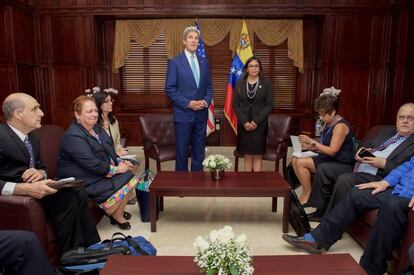Washington to begin direct talks with Venezuela “immediately”
Goal is to reestablish diplomatic relations, as well as to mediate between government and opposition


The United States and Venezuela have agreed to begin direct talks immediately.
A statement by US Secretary of State John Kerry on Tuesday evening in Santo Domingo, which was confirmed shortly afterward by Venezuela’s President Nicolás Maduro in Caracas, says that the talks will focus on ways to reduce tension between both countries and bring about dialogue between the government and opposition.
The bilateral talks will be between Kerry and his Venezuelan opposite, Delcy Rodríguez. Kerry has tasked US Under-Secretary of State for Political Affairs Thomas Shannon with contacting officials in Venezuela to set up talks aimed at overcoming “old rhetoric”.
“I said to her [Rodríguez], look, we can stay trapped in this war of words. But we have to achieve something that meets the needs of the people of Venezuela and respects the Constitution and the Venezuelan process,” Kerry told journalists after the meeting in Santo Domingo.
Kerry added that Rodríguez had suggested starting a “new era of dialogue through new communication channels and a series of high-level meetings immediately”.
The key figure in this attempt to improve relations with Venezuela is Thomas Shannon, a regional expert and career diplomat
Shortly afterward, Maduro appeared on Venezuelan television to officially announce the initiative. The long-term goal of the talks will be to reestablish diplomatic relations.
Tension between Washington and Caracas reached a high point in March 2015, when the United States declared Venezuela “an unusual and extraordinary threat to national security and foreign policy” and imposed sanctions on a number of senior government officials it accused of corruption and human rights abuses.
The key figure in this attempt to improve relations with Venezuela is Thomas Shannon, a regional expert and career diplomat. Shannon was reportedly behind the initiative to send Spanish former prime minister José Luis Rodríguez Zapatero, along with Leonel Fernández and Martín Torrijos, the former presidents of the Dominican Republic and Panama, to Venezuela to mediate between the government and the opposition.
Washington has made clear its support for efforts by the Venezuelan opposition to arrange a recall referendum. The opposition says that the only way out of the country’s worsening economic crisis is through a change of government. It proposes reducing the presidential term from six to four years, as well as requiring Maduro to step down and for a recall referendum to formally depose him.
Venezuela’s opposition has already gathered more than 1.1 million signatures for the petition for a recall referendum on the president.
Sign up for our newsletter
EL PAÍS English Edition has launched a weekly newsletter. Sign up today to receive a selection of our best stories in your inbox every Saturday morning. For full details about how to subscribe, click here.
Under Venezuela’s Constitution, presidents can be removed from office by means of a referendum once they have served half their term.
Venezuela’s National Electoral Council (CNE) is on its way to being able to announce the next step in the process to call the referendum. After a meeting with the CNE, the executive secretary of the Democratic Unity Roundtable (MUD) opposition group, Jesús Torrealba, said that it had validated 1.3 million of the nearly two million signatures on the petition calling for a vote on Maduro’s continuing leadership. In fact, the opposition has delivered more than six times the number of signatures needed to start the process.
Venezuela is mired in an economic crisis partly caused by a prolonged drought, prompting the government to introduce a state of emergency and a four-day working week. In turn, the opposition, which controls Congress, blames the government for economic mismanagement that has led to widespread shortages of basic goods and continual power cuts.
English version by Nick Lyne.
Tu suscripción se está usando en otro dispositivo
¿Quieres añadir otro usuario a tu suscripción?
Si continúas leyendo en este dispositivo, no se podrá leer en el otro.
FlechaTu suscripción se está usando en otro dispositivo y solo puedes acceder a EL PAÍS desde un dispositivo a la vez.
Si quieres compartir tu cuenta, cambia tu suscripción a la modalidad Premium, así podrás añadir otro usuario. Cada uno accederá con su propia cuenta de email, lo que os permitirá personalizar vuestra experiencia en EL PAÍS.
¿Tienes una suscripción de empresa? Accede aquí para contratar más cuentas.
En el caso de no saber quién está usando tu cuenta, te recomendamos cambiar tu contraseña aquí.
Si decides continuar compartiendo tu cuenta, este mensaje se mostrará en tu dispositivo y en el de la otra persona que está usando tu cuenta de forma indefinida, afectando a tu experiencia de lectura. Puedes consultar aquí los términos y condiciones de la suscripción digital.








































